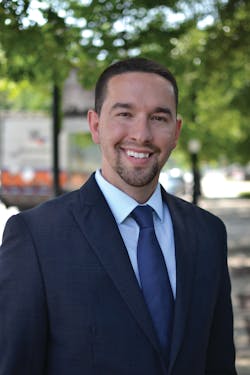Brian Smart began his career in 2006, as a planner at a mid-size firm based in Atlanta, George, where he provided support for local transportation projects, including multi-use trails and bike lanes in Gwinnett County, as one of metro-Atlanta’s fastest growing counties, and last-mile connectivity projects near some of Atlanta region’s most heavily used transit stops.
The following year, Smart entered graduate school at Georgia Tech where he began working on his master’s degree in city and regional planning. Over the summer of 2008, Smart worked as an intern at the Georgia Department of Transportation, where he supported planning staff in the delivery of Georgia’s s transportation enhancement program and helped to prioritize bicycle, pedestrian, and last-mile connectivity projects in key areas across the state. During his second and final year in the city and regional planning program, he was elected president of Georgia Tech’s Student Planning Association and was also selected as “Best All Around Student” by the faculty of the School of City and Regional Planning.
After graduation, Smart transitioned into a project manager role continuing to work on local transportation projects and providing technical support for the alternatives analysis for the Georgia Department of Transportation’s Atlanta to Chattanooga High Speed Ground Transportation Study. In 2010, he accepted a two-year term appointment position as an environmental protection specialist with the Federal Transit Administration (FTA). While at FTA, he provided invaluable support to numerous transit providers and managed the environmental review process for numerous transit projects across the southeastern United States and Puerto Rico.
Currently Smart is a senior transit planner and the National Environmental Policy Act (NEPA) lead for Aecom’s southeast region transit planning practice and has worked with transit agencies to implement key projects in many Southeastern U.S. cities and transit markets. Recent experiences include managing the environmental review process for the Georgia Multimodal Passenger Terminal (MMPT) in downtown Atlanta, Atlanta Streetcar, Atlanta BeltLine, Fort Lauderdale Streetcar, Central Florida Commuter Rail/SunRail in Orlando, Lynx Blue Line Extension in Charlotte, Charlotte Streetcar, Durham-Orange Light Rail Transit, and the Jacksonville Transit Authority’s bus rapid transit corridors in Jacksonville, Florida.
Smart was also responsible for nomination of the Georgia MMPT project and eventual selection by the White House as a project of regional and national significance to serve as a demonstration project to help implement Executive Order 13604 – Improving Performance of Federal Permitting and Review of Infrastructure Projects.
“After visiting Seaside, Florida, as a child — the birthplace of New Urbanism — I knew that I was going to be a city planner. However, my interest in transit planning did not start until I was in graduate school at Georgia Tech and actually lived in the city for the first time. It is here that I began to really understand how efficient cities are when they have mobility options. I learned this through first-hand experience living and working in Atlanta and through my graduate studies at Georgia Tech. Cities with transit and other mobility options are happy places and they are places where people want to live, work and play.”
“I would like to see more public support for public transit. As a transit planner living and working in Atlanta, I understand that the next frontier for our transit planning work is getting the majority of the people in this region, if not everyone, excited about transit expansion projects and new transit service that have been planned and discussed for years. One of the things that I don’t think most people realize is that transit options remove cars from severely congested roadways. Those who will never consider transit for their daily commute should learn to support transit expansion because it will most likely improve their experience if fewer cars are on the roadway. And that is where my job is most important — turning raw transit data into a presentation and conversation that is easily understood by the public. Furthermore, if we are happy with a service such as public transit, it tends to translate into demands which may be heard by our elected officials — possibly paving the way for changes in the way we fund public transit service.”




